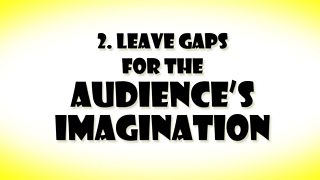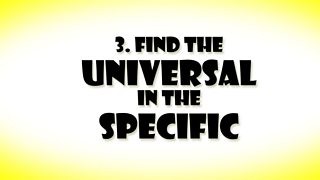Script consultant, editor and producer Philip Shelley runs the annual Channel 4 Screenwriting Course. In his second blog for BBC Writersroom he shares his six top tips for new writers who are trying to get their voice heard.

The initial idea behind the script is all-important. As one of the writers on this year’s Channel 4 screenwriting course put it, ‘I try to focus on what’s bothering me.’ If you’re writing a spec' script that you hope is going to open doors for you, try not to be too influenced by perceptions of the industry and what’s fashionable at that moment. You can be sure that by the time you finish the script and want to send it out into the world 6 months later that what was so fashionable then, is old hat now.
Ideally, the spec' script you write should be a script that only YOU could write. Think about what areas of life particularly excite you, where your passions lie, and also what things you know a lot about. We’re all different and we all have our own obsessions. It’s so often these strange specifics that are unique to you that will make you stand out from the crowd.
The writer’s agenda is so important. So much of the best work is predicated on a writer’s passion, fury or enthusiasms. Make sure you believe in what you write, and find ways to express that belief through your story.
What I want when I’m reading a spec' script is to be emotionally engaged – I want your script to stir my emotions. So you need to tell a story that you know is going to stir YOUR emotions.
This isn’t to say you have to always ‘write what you know’ – but you do need to ‘know what you write’ – research is such a key element of good writing. Immerse yourself in the world you’re writing about, and make sure you’re bringing a perspective and a knowledge to the subject that is revealing and honest.

So much of the best story-telling is incomplete – encourage the audience to fill in story gaps for themselves. The best stories ask us (the audience) to do much of the work, providing our own imaginative answers to the spaces in the story.
One of the narrative virtues of film are the cuts between the scenes. Take us on a journey but don’t show the driver unlocking her car, doing up her seat-belt, setting up her sat-nav, checking the mirrors... you get the picture. Show the driver getting into the car, then CUT TO the accident, the pick-up, the road rage (or whatever). Story is about the choices you make, the moments you choose to show, and – crucially - the moments you choose to leave out.

So often it’s the specific visual detail / action that reveals a character or a relationship. In the best stories, we see moments that are so strangely specific, that they feel honest and true – and therefore recognisable. Conversely, the familiar moments often feel familiar because we’ve seen them in other films, TV shows – and we resist them.
So many of the best dramatic moments come from a simple, specific visual – in a way that pages of dialogue often fail to achieve. If in doubt tell your story in visuals and actions rather than dialogue.

Don’t invent story – steal and adapt it from real life. Take your earphones out when you’re in town, walking, travelling on public transport, in any public space – and OBSERVE.
Identify the people, places and things that pique your interest, and take notes. And think about what it is about the interesting people that makes them interesting to you. Take a person you’ve observed, and create a life for them, suggested by their manner, the way they dress, the things you overhear them say on their mobile phones – and imagine the rest of their lives.

But steering away from the too obviously commercial, making sure your idea doesn’t feel too ‘second-guess-y’ doesn’t mean you shouldn’t also immerse yourself in the craft and culture of screenwriting and other dramatic writing. So – if you’re writing a rom-com, it can sometimes be enormously helpful to minutely study the genre – watch and read as many rom-coms as you can manage, think about what works about the best ones, what doesn’t work about the worst ones, and apply the lessons you’ve learnt to your own story.

The big thing that script editors, producers, literary agents seem to agree on about what they DON’T want in a spec’ script is familiarity, something that feels derivative, as if the writer is second-guessing what they think the industry wants, writing something self-consciously ‘commercial.’
What we’re all looking for is something that expresses your unique ‘voice’ as a writer – the qualities that express who you are as a writer, that articulate your passions, and play to your specific strengths. So – above all – please yourself. Write something that you’re excited to write, something that you need to write, a script that you’re prepared to get behind, a script that you can pitch with passion and excitement.
Trust that if it excites you, it will excite your reader.
PHILIP SHELLEY runs the script consultancy www.script-consultant.co.uk and initiated and runs the annual Channel 4 Screenwriting Course (4Screenwriting, part of 4Talent, now in its 7th year).
He has worked as script editor and producer for many companies including the BBC, ITV, and several indies. He has taught sessions in screenwriting and script-editing for, among many others, the Indie Training Fund, Northern Ireland Screen, Screen-Training Ireland, Bath Spa University and BBC Media Action in Cambodia.
His new venture is a series of dramatic monologue podcasts by new writers www.tributepodcasts.co.uk
Read: Three Steps to Script-Editing Success by Philip Shelley
